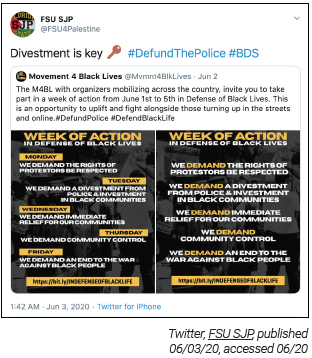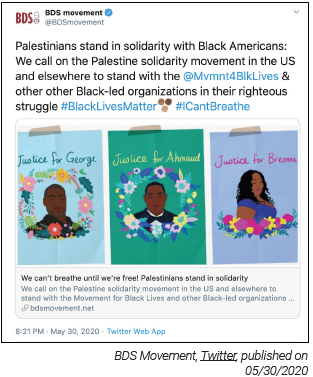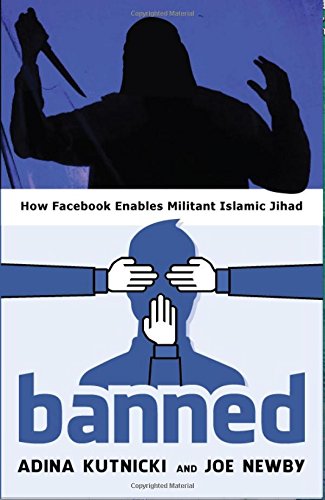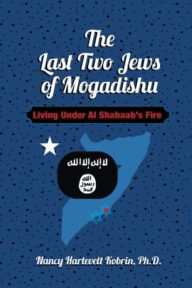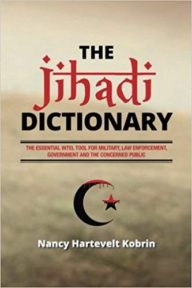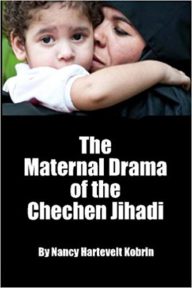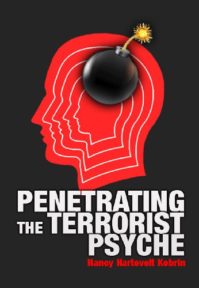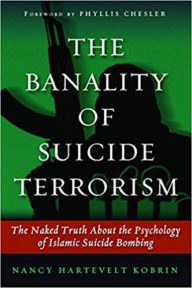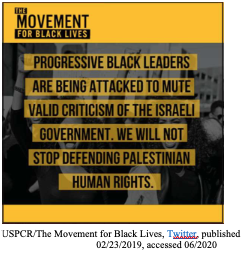
THE BDS AND THE PALESTINIANS’ ALLIANCE WITH BLM = BLM’s ASSOCIATION WITH TERRORIST-LINKED BDS GROUPS [Parts I & II]
AMERICAN CENTER FOR DEMOCRACY | By Dr. Rachel Ehrenfeld | August 18, 2020
Black Lives Matter, Israel & Intersectionality
Since the founding of the Black Lives Matter (BLM) movement in 2013, the delegitimization (DLG) network against Israel and its activists have embarked on a propaganda campaign that draws parallels between police violence in the US against African Americans and violence against Palestinians by the Israel Police and the Israel Defense Forces (IDF). This fictitious parallel is part of a strategic attempt by the delegitimization network to entrench itself and the BDS movement as a focal point of the progressive movement.
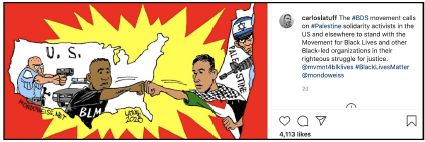
Intersectionality posits that no form of discrimination is distinct from another. This includes discrimination that emanates from capitalism, white supremacy, government, prison and justice systems, the police force, colonialism, gender hetero-normativity, and other institutionalized norms.
After the killing of George Floyd, DLG activists immediately began drawing comparisons with what they describe as systematic and deadly Israeli brutality against Palestinians. The comparisons were given further impetus in the wake of the May 30th killing of Iyad Halak, an autistic Palestinian from East Jerusalem, by Israeli police in Jerusalem’s Old City.
The image below, typifying the campaign, depicts a photoshopped image of George Floyd on the West Bank security barrier.
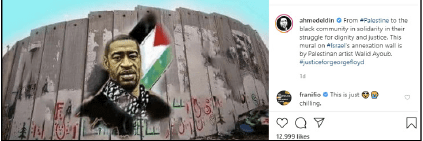
A doctored image shared across social media and news platforms as “fake news” about a nonexistent new mural on the West Bank Separation Barrier tying George Floyd’s murder to Palestinian causes.
As seen in the following screenshots, Intersectionality not only seeks to absorb all minority issues under the same umbrella, but it also seeks to depict the US and Israel as one and the same, going so far as even changing the colors of the American flag to match those of the Israeli flag.
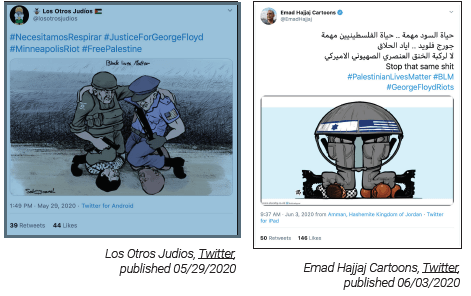
Translation: The lives of blacks are important. the lives of the Palestinians are important to George Floyd. Iyad Halak, no to the American Zionist racial strangulation. Stop that same shit #BLM #PalestinianLivesMatter
German DLG website Das Palästina Portal published an article titled “Gaza is everywhere! What the current unrest and protest in the US has to do with Israel” which argues that police brutality can be attributed to an “ongoing Israelization of the world.” The following image was included in the article:

DLG Activity & Calls for Intifada
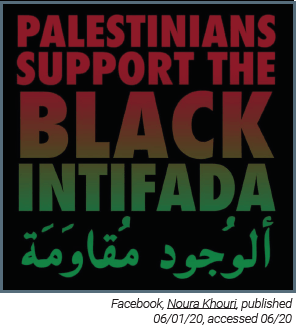
Several DLG groups have applied violent terms such as “Intifada” (Arabic for uprising) to the current eruption of protests in the wake of George Floyd’s killing. The term Intifada was the name given to the first and second Palestinian violent riots in the late 1980s and early 2000s, which witnessed daily terror attacks, including, inter alia, suicide bombings, stabbings and shootings against Israeli civilians, claiming thousands of lives. By describing the current wave of protests as a “black intifada”, the DLG statements may constitute incitement to violence and terror.
Samidoun, a global DLG organization with close ties to the Popular Front for the Liberation of Palestine, a US-designated terror organization, released a statement titled “From Gaza to Minneapolis, one struggle for justice and liberation! #JusticeForGeorgeFloyd” in which it called the protests an “intifada.” The statement declared: “We support the uprising in Minneapolis, the intifada of people subjected to an ongoing, vicious and structural racism, inheriting a lengthy and rich tradition of Black resistance, organizing and struggle.”
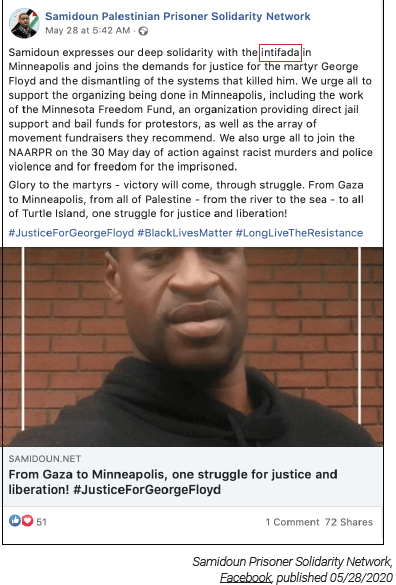
On June 2, the PFLP published a statement in Arabic in solidarity with protestors, stating, “it is not surprising for a country like the United States, which has a strategic alliance with the Zionist entity [Israel], to intersect with it in the discrimination, racism, and repression that embodies its treatment of Palestinians.”

Popular Front for the Liberation of Palestine, PFLP.ps, published 06/02/2020
Translation: The PFLP expresses its solidarity with the American people against racism
Amin Abou Rashed, a DLG leader who was designated in 2013 by the Israeli Justice Ministry as part of Hamas in Europe and head of Palestinian Community in the Netherlands (PGNL), attended a Rotterdam protest, holding a sign featuring images of Floyd and Halak with the text “different countries, same injustice.”
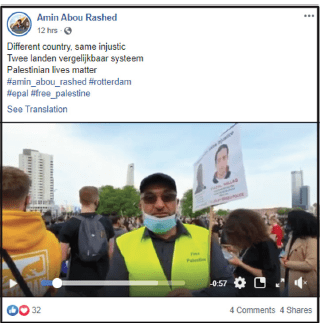
Amin Abou Rashed, Facebook, published 06/03/2020
Deadly Exchange Campaign & George Floyd’s Death
Since 2017, Jewish Voice for Peace (JVP) and other DLG groups have participated in a campaign known as “Deadly Exchange.” The campaign accuses Israel of exporting police brutality to United States law enforcement via educational trips to Israel and domestic conferences with Israeli partners.
Since George Floyd’s death, DLG activists have used the same campaign rhetoric claiming that Israel participates in a “deadly exchange” of skills and technology with Minnesota police – a claim which is often made without supporting evidence. According to DLG groups, therefore, Israel bears partial responsibility for Floyd’s death and other cases of police violence against black Americans.
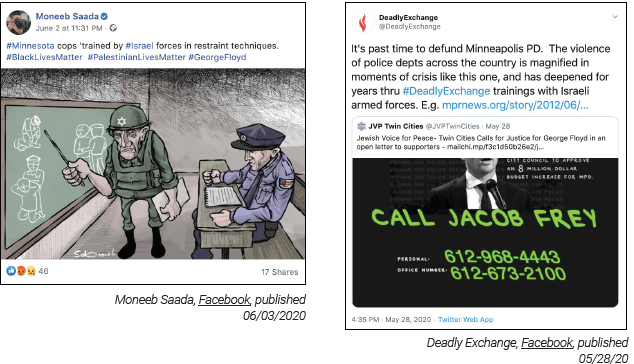
The only evidence of Israel-Minnesota police cooperation is a June 2012 half-day counter-terrorism training conference sponsored by the Israeli consulate in Chicago, the FBI, and Minnetonka police. The conference was attended by no more than 100 officers from across the state.
However, the MPR News article on the 2012 conference has been cited by Electronic Intifada journalist Nora Barrows Friedman and journalist Max Blumenthal as evidence of Israeli influence on Minneapolis police. EI journalist Asa Winstanley tweeted that pro-Israel journalist David Collier was a “Zionist anti-Semite” for refuting their claims.
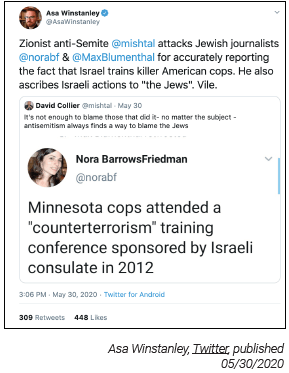
Referencing “intersectionalism,” the International Solidarity Movement (ISM) tweeted that “over 100 police in the state of Minnesota, where George Floyd was killed, attended trainings with Israeli forces.”
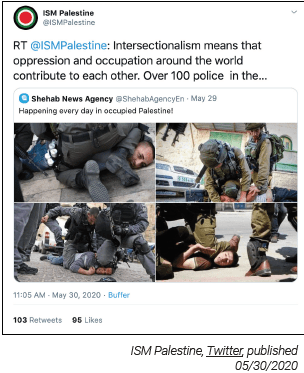
Fordham SJP also claimed in a May 27th Instagram story that, “we see the same tactics” because Minneapolis police participated in the [2012] training.
Al-Awda retweeted a tweet by its founder Abbas Hamideh containing the unverified claim that Minneapolis police are trained by the IDF.
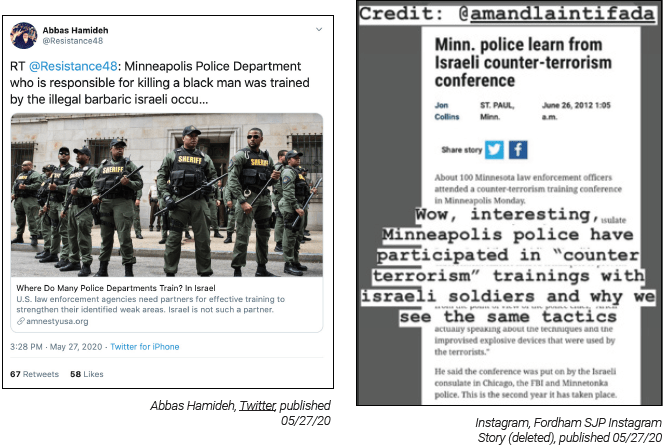
Additional Examples of DLG Activity
Students for Justice in Palestine (SJP) at Florida State University (FSU) posted on its Facebook the hashtag #DefundThePolice, while calling for a number of actions to be taken in defense of black lives and against the police.(see below)
Gazan Great March of Return (GRM) organizer Ahmed Abu Artema wrote an op-ed in The Electronic Intifada titled “From Minneapolis to Palestine, racism is a common enemy.”(see below)
BDS umbrella group BDS National Committee (BNC) released a statement stating, “As long as this system of oppression continues, it is up to our grassroots movements to work collectively and intersectionally to dismantle it, from the US to Palestine.”(see below)
BDS US group Adalah Justice Project linked white supremacy and Zionism, accusing them of being “underpinned by anti-Blackness.”
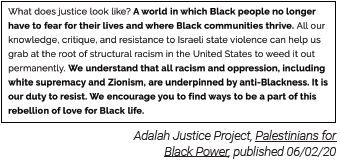
Palestinian Youth Movement (PYM) posted a live Facebook video from a May 31st San Diego demonstration. PYM has publicly praised the “intifada” and Palestinian terrorists.
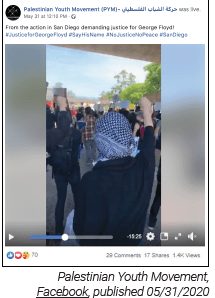
US Palestinian Community Network (USPCN), which has founders and leaders connected to terror, sent a delegation to the Chicago protests.

Several DLG groups posted images drawing parallels between the US and Israeli police violence, or specifically between the Halak and Floyd killings.
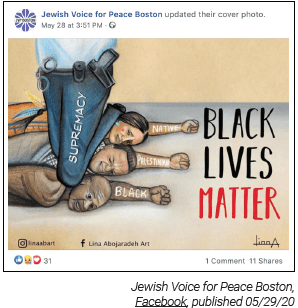
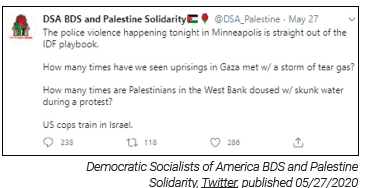
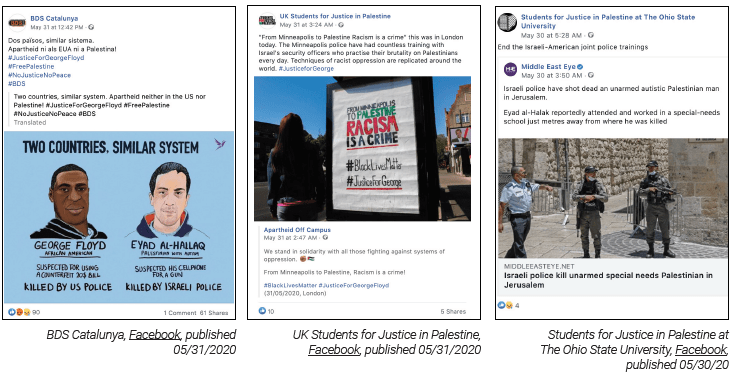
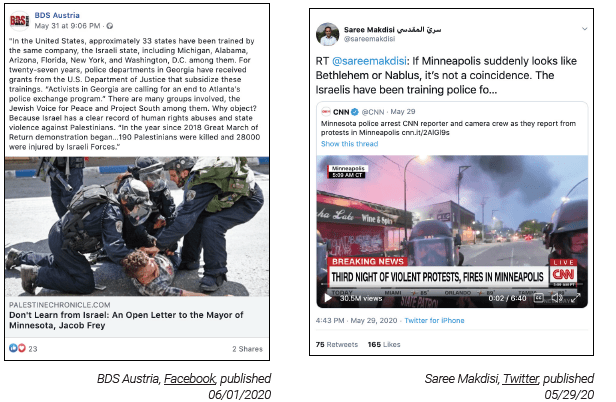
Hashtag Analysis: #PalestinianLivesMatter
The hashtag #PalestinianLivesMatter, inspired by #BlackLivesMatter, has been employed by DLG activists on Twitter since at least 2015.
This hashtag’s popularity surged following the killing of George Floyd as BLM protests gained momentum in the US. Many DLG activists campaigned to highlight intersectional parallels between African American and Palestinian causes, once again reviving this hashtag.
Usage of #PalestinianLivesMatter on Twitter grew exponentially from May 28-30, 2020:
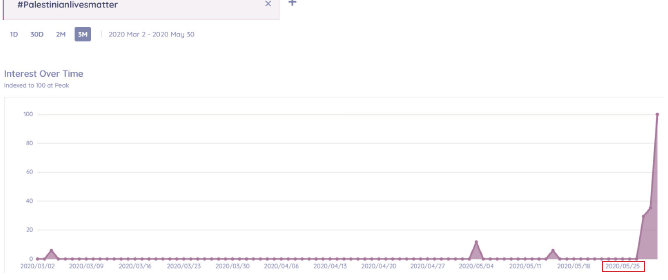
The hashtag #PalestinianLivesMatter was also highly visible to Twitter users from June 2-3, reaching an estimated 29.4 million users in this 24-hour period:

See below examples of tweets posted by DLG activists using #PalestinianLivesMatter, connecting Halak and Floyd’s killings:
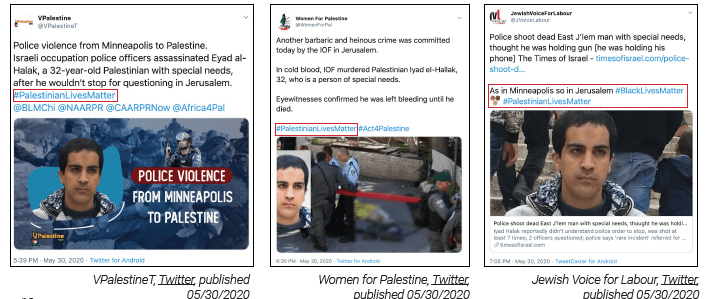
A more detailed analysis of the hashtag shows that from May 30-31, tweets using #PalestinianLivesMatter in the wake of Halak’s killing were most commonly shared by accounts belonging to the delegitimization groups Women for Palestine (WomenforPal), Jewish Voice for Labour (JVoiceLabour), and Friends of Palestine (F_of_Pal). Twitter accounts VPalestineT and MustBeQuared also had high numbers of retweets.
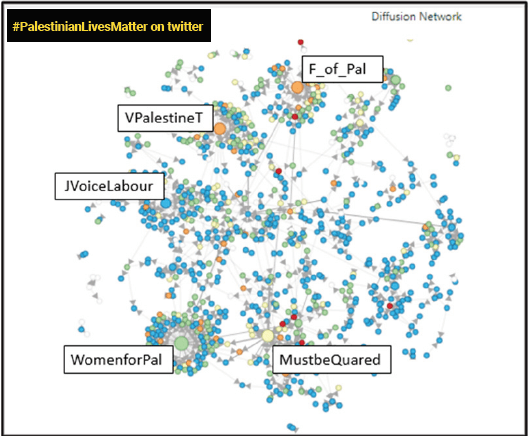
Al Jazeera’s Arabic channel Aljazeera Mubashar posted the hashtag on June 3rd to its Facebook page, which is followed by 14 million accounts, and to its Twitter, which is followed by 4 million Twitter accounts.
On June 3rd the most shared tweets with #PalestinianLivesMatter came from Venezuelan propaganda network Telesur English (@telesurenglish) and Lebanese journalist Claude El Khal (claudeelkhal)
Antisemitism at the Protests
On May 30th, as protests against Floyd’s killing swept Los Angeles, protestors graffitied “F-ck Israel, Free Palestine” on the wall of one synagogue, and vandalized and smashed windows of several other synagogues and kosher businesses. The protests have also led to numerous antisemitic posts on social media.
On May 31, the window of a synagogue in Richmond, Virginia was smashed by protestors.
Berlin-based artist Ehssan Dariani posted to Facebook a conspiracy replete with Type 2 of the IHRA working definition of antisemitism by “Making mendacious, dehumanizing, demonizing, or stereotypical allegations about Jews as such or the power of Jews as collective — such as, especially but not exclusively, the myth about a world Jewish conspiracy or of Jews controlling the media, economy, government or other societal institutions.” According to Dariani’s post AIPAC and Sheldon Adelson were responsible for the conditions that sparked the riots.
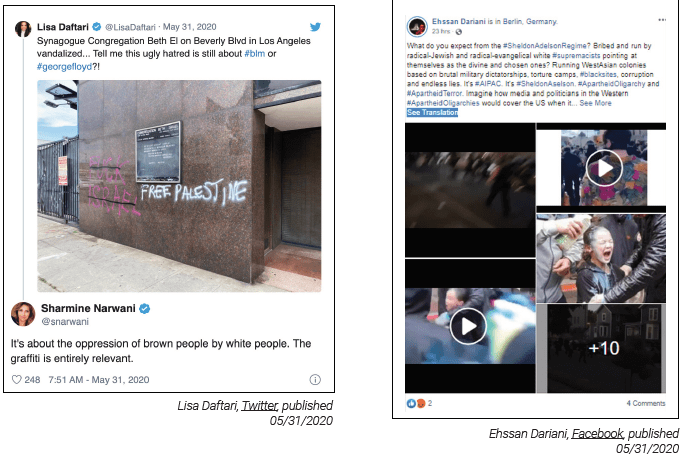
Andrew Anglin, founder of the Neo-Nazi website Daily Stormer wrote in a blog post about the protests, saying “Fear not the blacks who can burn your city, but fear the Jews who can release the blacks to burn your city and lock you in your house in hell.”
Counter protestors at a June 3rd demonstration in Bismarck, North Dakota flew a Nazi flag from their car.
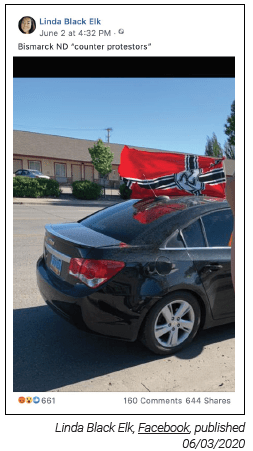
On June 2nd a Palestinian Community Contingent attended a George Floyd Protest in Houston hosted by PYM, Palestinian American Cultural Center-Houston, and SJP at the University of Houston. One of the speakers at the rally attended by the contingent was Tamika Mallory, a former National Women’s March organizer who stepped down amid accusations of antisemitism.
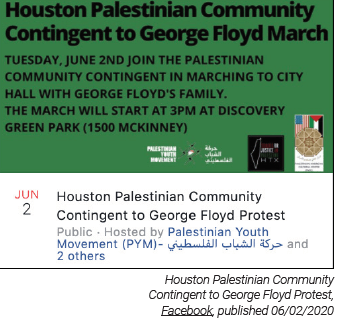
♦ ♦ ♦ ♦ ♦
And now that there is not even a scintilla of a doubt, yes, proof positive per the alliance between BDS terror-linked Palestinians to BLM terrorists, well, let’s go in reverse: Is the feeling mutual, or is it unrequited love, so to speak??
♦ ♦ ♦ ♦ ♦
BLM’s Association with Terrorist-Linked BDS Groups (part II)
Organizations and activists participating in the delegitimization campaign against Israel, support the boycotts, divestment, and sanctions (BDS) movement, and expressly support US-designated Palestinian terror organizations, have strategically entrenched themselves in partnerships with Black Lives Matter (BLM) since the establishment of the movement in 2013.1
By successfully creating coalitions with BLM, the delegitimization network has infiltrated and influenced the BLM agenda to openly support BDS and other anti-Israel causes. These include an explicit call for the divestment from Israel, which was featured prominently in the 2016 BLM platform, sending BLM delegations to the West Bank to protest the Israeli military and meeting with BDS leaders and convicted Palestinian terrorists. Several BLM founders and prominent leaders are connected to delegitimization organizations. These same leaders have gone beyond the call to divest from Israel or to oppose the United States (US) military-aid to Israel and have advocated for Palestinian terrorists and terror groups.
BLM Anti-Israel Policy Platforms
In 2016, BLM released a series of policy platforms, listing their political objectives. One of the platforms, “A Cut in US Military Expenditures and A Reallocation of those Funds to Invest in Domestic Infrastructure and Community Wellbeing,” cites the delegitimization (DLG) organizations Adalah, The US Campaign to End the Occupation, and Dream Defenders as organizations “currently working on policy.”2 According to the platform:
“The US justifies and advances the global war on terror via its alliance with Israel and is complicit in the genocide taking place against the Palestinian people … Israel is an apartheid state with over 50 laws on the books that sanction discrimination against the Palestinian people … Everyday, Palestinians are forced to walk through military checkpoints along the US funded apartheid wall.”3
The BLM platform calls on the federal government to “Build invest/divestment campaigns that ends US Aid to Israel’s military industrial complex and any government with human rights violations,” citing the Palestinian BDS National Committee website BDSmovemenet.net.4 In October 2015, several months prior to the release of the BLM platform, the BNC initiated a campaign “Links that Kill: International military cooperation with Israel,” which featured statements and action points calling for the end of military aid to Israel echoed in the BLM platform.5
These statements reflect the talking points of the delegitimization campaign against Israel in the US. The aforementioned BDS organizations directly influenced the BLM
platform, specifically its policies relating to military aid and rhetoric opposing US foreign policy in the Middle East. The standpoint against Israel was also shaped by the BDS’s contribution to drafting the platform and setting the BLMagenda. These organizations and the BDS movement itself have well-documented connections to US-designated terror organizations including Hamas and the Popular Front for the Liberation of Palestine (PFLP).6
One of the organizations cited in the BLM platform as “currently working on policy” is the US Campaign to Endthe [Israeli] Occupation, which was renamed US Campaign for Palestinian Rights (USCPR) in October 2016.7 USCPR, a national coalition of over 400 US-based BDS-supporting organizations, is the defendant in an ongoing lawsuit thatbegan in November 2019, filed by American-Israelis and the Israeli environmental NGO Keren Kayemeth Yisrael-Jewish National Fund, for funneling donations to Hamas and other US- designated foreign terror organizations during Gaza’s “Great Return March” protests, which began in March 2018.8 The case asserts that USCPR directed onlinedonations to the BDS National Committee (BNC) – the umbrella organization that steers and coordinates the global activities of the BDS movement – as a means to support and sponsor known Palestinian terror organizations which are members of the BNC. In so doing, the lawsuit also asserts, that USPCR provided material support for Gaza-basedterrorists who launched incendiary kites and balloons into Israel.9 Aside from their contribution to the BLM platform, USCPR has also collaborated with BLM and its leadership on several other initiatives (see pages 3, 7 and 10 of thisreport).
Another organization cited as a policy contributor to the BLM platform is Dream Defenders. A Florida based organization, Dream Defenders focuses on minority rights and criminal justice, which has expressed support for Palestinian terror, including the PFLP. For example, in 2016 Dream Defenders created a “Rebellion” curriculum for students in grades 6-11 that included a section praising the PFLP.10 It also holds annual delegations to the West Bankwhich include meetings with convicted PFLP-terrorists and PFLP-affiliated Palestinian NGOs, such as Addameer.11 Dream Defenders has championed the “intersection” of Palestinian and African-American causes since its establishment in 2012. According to Palestinian-American co-founder Ahmad Abuznaid, “From the very beginning we spoke about the internationalist roots in the black radical tradition … We were mindful of the fact … that there was a historical connection between the black radical tradition and people who were seeking Palestinian liberation like the Black Panther party.”12
One BLM platform author, Nadia Ben-Youssef, heads the Adalah Justice Project, a sister organization of the Arab-Israeli NGO Adalah.13 Until 2018, Ben-Youssef sat on the steering committee of USCPR.14 Ben Youssef also sits on the advisory board for the Jewish Voice for Peace-led “Deadly Exchange” campaign, which aims to end cooperation between the US and Israeli police forces.15 It registered its first success in Durham, North Carolina in April 2018, when the city decided to end police training in Israel.16
In May 2018, BLM released a statement titled: “The Movement for Black Lives Stands With the Palestinian People.”17 The statement expressed support for the Palestinian Great March of Return, which was attended andsupported by Palestinian terror groups including Hamas, Islamic Jihad, and the PFLP, and funded in part by donations from USCPR (a contributing author to BLM’s official platform).18 BLM’s statement urged the US government to divest from Israel and re-appropriate military aid to Israel to Palestinians. The statement referenced Israeli-US police exchanges as grounds for such measures, and was reflective of the Deadly Exchange Campaign:
“We know that police officers in the United States learn the tactics of war from Israeli police forces, who come annually to train U.S. officers in methods of oppression, surveillance and murder. We understand that we are connected to the Palestinian people by our shared demand for recognition and justice and our long histories of displacement, discrimination and violence.”19
In February 2019, BLM released a series of infographics shared on USPCR’s Twitter “in solidarity with the Palestinian people,” including one stating, “progressive black leaders are being attacked to mute valid criticism of the Israeli government. We will not stop defending Palestinian human rights.”20
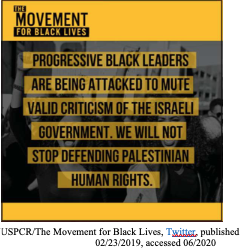
BLM Anti-Israel Policy Platforms
Several leaders of BLM and other black civil rights organizations in the US have attributed increased solidarity with Palestinian causes to participation in delegations to the West Bank. Palestine Legal communications manager Kristian Davis Bailey cites a 2013 trip organized by Eyewitness Palestine (formerly Interfaith Peacebuilders) as his introduction to DLG causes and black-Palestinian solidarity. Eyewitness Palestine delegations to the West Bank have hosted participants inside the PFLP stronghold Dheisheh refugee camp and organized delegations to meet with convicted PFLP terrorists and PFLP- affiliated NGOs.Delegation participants have praised the PFLP on social media during and upon return from their trips.21 According to Bailey “Almost none of the organizing or writing I’ve done over the past two years would have been possible without making connections and building relationships with Palestinians directly on the ground.”22 In 2015, Baily founded the organization Black for Palestine and co-authored the Black Solidarity with Palestine Statement signed by over 1,000 black activists including Angela Davis, Cornel West and Mumia Abu-Jamal.23 Thirteen of the activists who signed the Black Solidarity with Palestine Statement listed BLM as their affiliation.24
In January 2015, BLM cofounder Pattrice Cullors attended a Dream Defenders delegation featuring members of Black Lives Matter, Women’s March organizer Carmen Perez, and leaders of Hands Up United, an organization formed to combat police violence in Ferguson, Missouri.25 In an interview with Ebony magazine upon her return, Cullors called Israel is an “apartheid state,” stating:
“To deny this makes one complicit with Zionist violence … I believe the Black Lives Matter movement can benefit greatly by learning about struggles outside of the U.S., but particularly the Palestinian struggle … I want this trip to be an example for how Black folks and Arab communities can be in better solidarity with one another.”26
Professor, pundit, and DLG and BLM activist Marc Lamont Hilln(see more information on page 9-10) cites that his evolving support for convicted Palestinian terrorists can be traced back to the same 2015 delegation to Israel and the West Bank.27
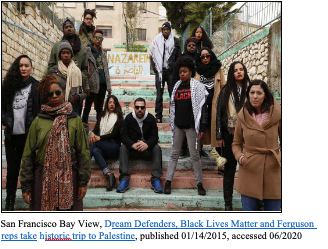
From July 17-30, 2016 BLM activists participated in an Eyewitness Palestine delegation to the West Bank. On July 29, 2016, BLM posted a statement on its Facebook about a protest in the Palestinian village Bil’in attended by its delegation participants. According to the statement:
“In this violent, political climate, it is urgent that we make clear the connection between violence inflicted on Black people globally that is encouraged and permitted by the state and the profiling, harm, and genocide funded by the United States and perpetrated by Zionists vigilantes and the Israeli Defense Forces on Palestinian people. Our collective oppression mandates that we work together across geography, language and culture to decry and organize an end to capitalistic, imperialist regimes. We commit to global struggle, solidarity, and support of the Boycott, Divest and Sanction (BDS) movement to fight for freedom, justice and equality for Palestinian people and to end international support of the occupation.”28
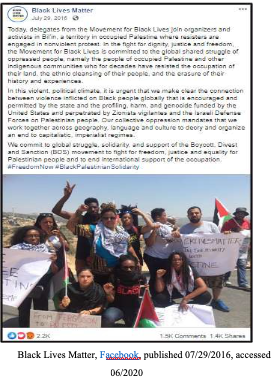
The 2016 delegation participants also attended a protest to free convicted PFLP member Bilal Kayed from Israeli prison.
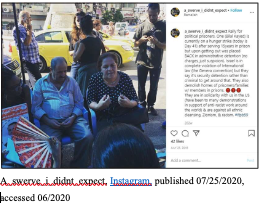
Delegation participants also met with Afro-Palestinian activist and former member of the PFLP, Ali Jiddah (pictured with red box in image below).29 Jiddah served 17 years in Israeli prison for planting four hand grenades in downtown Jerusalem before he was released in 1985 during a prisoner exchange.30
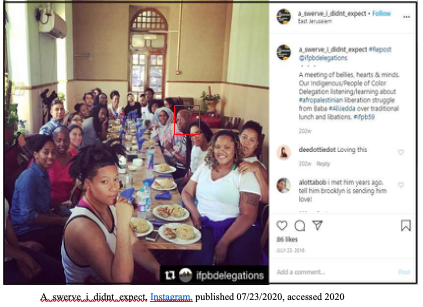
In November 2019, USCPR issued the press release “Delegation of Indigenous, Chicanx, and Black Activists Begin Second World Without Walls Delegation in Palestine/Israel to Share Anti-Border Militarization Tactics with Palestinians.” According to the press release:
“Seven Indigenous, Black, and Chicanx leaders in the immigration justice, anti-border wall, and anti-militarism movements have landed in Palestine/Israel to begin the second ‘World Without Walls’ delegation, organized by USCPR, Stop the Wall, and Eyewitness Palestine … The World Without Walls delegates will share their experiences and tactics for resisting walls and border militarization with native Palestinians resisting Israel’s Separation Wall.”31
In May 2018, Stop the Wall’s credit card donation facilities were withdrawn due to PFLP-linkages and BDS support.32
DLG Activity Promoted by BLM Leaders in the US
Due to the strategic entrenchment of the black-Palestinian solidarity agenda by the delegitimization campaign, BLM leaders have increased their participation in anti-Israel rhetoric and public events, sometimes by partnering with organizations and individuals affiliated with Palestinian terror groups.
In January 2018, BLM Los Angeles cofounder Melina Abdullah gave a speech at the Los Angeles Women’s March where she and her daughter accused Israel of being “complicit in the genocide of the Palestinian people.”33 Similarly, BLM Los Angeles activist Trudy Goodwin signed a Palestinian American Women’s Association (PAWA) petition pulling out of the 2018 Women’s March in LA because actress Scarlett Johannson was a confirmed speaker.34 PAWA and other DLG groups boycotted the march because Johannson was previously a spokesperson for the Israeli company SodaStream,which until 2014 had a manufacturing facility in the Israel-controlled Mishor Adumim industrial zone in the West Bank. PAWA was active in the campaign to stop the deportation of convicted PFLP terrorist Rasmea Odeh from the US, and in 2014 encouraged members to donate to her defense.35 Odeh was stripped of her US citizenship and deported from the US in 2017 because she failed to disclose information when she obtained US citizenship in 2014 about her imprisonment for participating in two 1969 PFLP bombings that killed two civilians.36
BLM co-founder Patrisse Cullors spoke at a May 2019 event hosted by UMass Students for Justice in Palestine (SJP) featuring DLG activists Marc Lamont Hill, Linda Sarsour, Roger Waters and David Zirin.37 On April 2, 2020. Cullors led a discussion hosted by Jewish Voice for Peace (JVP) featuring Arab Barghouti, the son of al-Aqsa Martyrs Brigade founder Marwan Barghouti, currently imprisoned by Israel on murder charges.
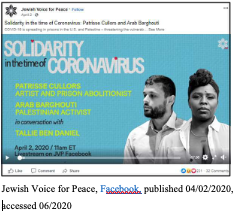
Marc Lamont Hill
Marc Lamont Hill is a professor at Temple University and a contributor to several prominent media outlets, including Huffington Post, CNN, and BET News. Hill is a supporter of Black Lives Matter,38 who has written extensively on the movement and spoken on behalf of the moment in the press, including the May-June 2020 protests.39 However, Lamont Hill is also an active supporter of the BDS movement and has made several statements in support of the PFLP.
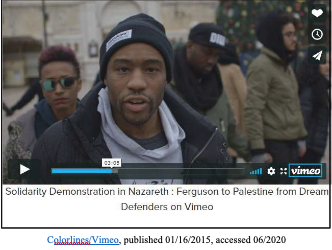
For example, as seen below, Lamont Hill has posted multiple pictures of himself with convicted PFLP terrorist Ali Jiddah (described by Hill as an “Afro-Palestinian” activist).40 Lamont Hill has also urged his followers to support Jiddahfinancially through a GoFundMe via Twitter.41
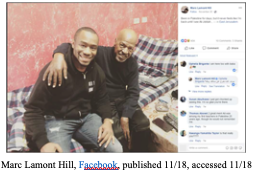
In 2016, Lamont Hill wrote a piece in the Huffington Post urging black activists to support convicted PFLP terroristRasmea Odeh after she was convicted by the United States of immigration fraud.42 The US case relied on Odeh omitting her 1969 terror conviction and imprisonment.43 Lamont Hill claimed that Odeh was tortured by Israeli authorities into falsely confessing to carrying out the bombing.44 However, Lamont Hill’s contention is not supported by statements made by Odeh herself years before her trial in the US.45
On September 28, 2018 Lamont Hill spoke on a panel at the USCPR national conference. Hill gave a statement at the conference in support of PFLP terrorist Leila Khaled and accused Israel of poisoning the Palestinians. Hill’s statements fall under Type 9 antisemitism according to the International Holocaust Remembrance Alliance (IHRA) definition, or “using the symbols and images associated with classic antisemitism to characterize Israel or Israelis.”46 Hill stated:
“How can you romanticize non-violence when you have a state that is at all moments waging war against you, against your bodies, poisoning your water, limiting your access to water, locking up your children, killing you, we can’t romanticize resistance … We’ve allowed this non-violent thing to become so normative that we are undermining our own ability to resist in real robust ways.”47
Hill then compounded his antisemitic statement with a clear an explicit declaration of support for terror, explaining that non-violence cannot be fetishized, rather, “If I am going to do this [resist], I am going in Laila Khaled style.”48 Khaledwas convicted of hijacking two passenger planes with the PFLP in 1969 and 1970 and continues to coordinate PFLP activities and praise violent attacks against Israel.49
Ties to Extremists in the US
Marc Lamont Hill has professionally collaborated with radical Palestinian-American activist, Nancy Mansour on a project called “Black in the Holy Land.”50 Nancy Mansour goes by the name ‘Harrabic Tubman’ on social media.51 Mansour is the co-founder of Existence is Resistance, an international organization established in 2009, that aims to “promote non-violent resistance through cultural arts.” Mansour is very active with Samidoun—Palestinian Prisoner Solidarity Network, a pro-BDS organization that serves as a proxy for PFLP.52 In 2013, while touring for her documentary, “Hip Hop is Bigger than the Occupation” in San Francisco, Mansour organized an impromptu demonstration against a gala being held by Friends of the IDF to raise money for the Israel Defense Forces.53 Mansour and others entered the hotel where the event was being held and began shouting anti-Israel slogans andarguing with hotel guests. Eventually, she was arrested for disturbing the peace and for assault with a deadly weapon after hitting someone with a bullhorn.54 Mansour was quoted by the Nation of Islam publication, “The Final Call,” expressing her support for Hamas.55
UN Remarks
In November 2018, CNN terminated its contract with Hill, a featured pundit on the network,56 after he gave a statement at the United Nations for International Day of Solidarity with the Palestinian people in which he said, “We must advocate and promote non-violence … we cannot endorse a narrow politics of respectability that shames Palestinians for resisting, for refusing to do nothing in the face of state violence and ethnic cleansing.” In his remarks Hill also called for a “free Palestine from the river to the sea.”57 In response to Hill’s remarks, Palestinian American DLG activist Noura Erakat penned a Washington Post op-ed stating that his speech, “forms an important part of a renewed manifestation of Black-Palestinian solidarity, itself a component of a longer legacy of black internationalism and Third Worldism.”58
Conclusion
Lead actors of the delegitimization campaign have prioritized coalition-building with African American civil rights groups, with the stated goal of radicalizing their partnership in the style of the Black Panthers since at least 2012. The establishment of the Black Lives Matter movement in 2013 provided the delegitimization network in the United States an opportunity to create a strategic partnership with leading African American civil rights activists. This partnership would serve as a lightning rod for exporting the DLG agenda to the US. This exportation has led to garnering sympathy, solidarity and even material support for US-designated terror groups and convicted terrorists. As a result of the deliberate partnership-building and delegations led by various DLG actors, the leadership of the Black Lives Matter(BLM) openly cooperated with DLG organizations in the US and promoted their agenda. Thus, BDS organizations, entirely disconnected from the racial tensions involving the protection of African Americans from police violence or other injustices, have entrenched themselves as key partners and benefactors of BLM and other African American civil rights groups

